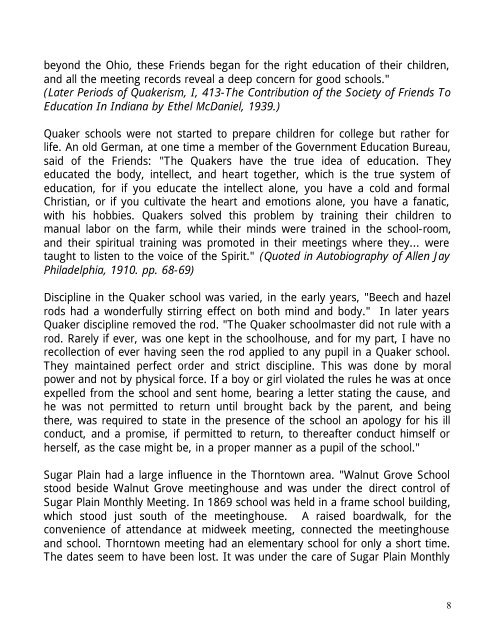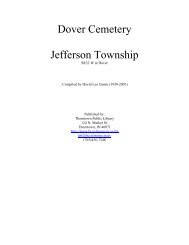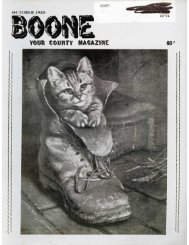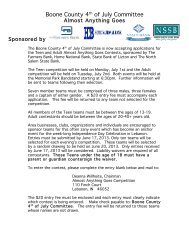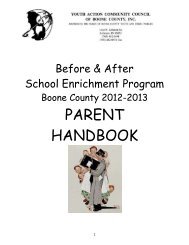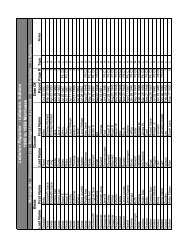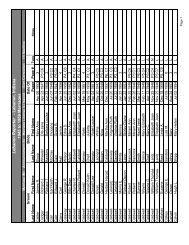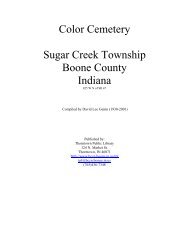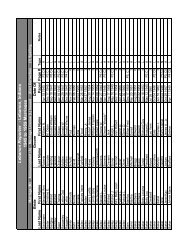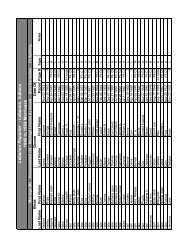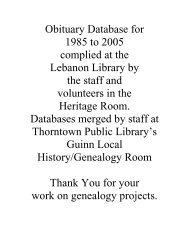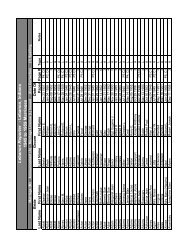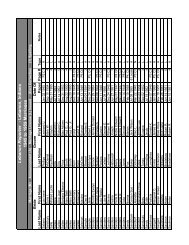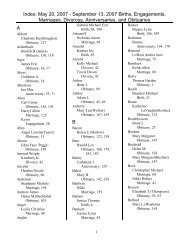History of Boone County Quakers - Boone County Community Network
History of Boone County Quakers - Boone County Community Network
History of Boone County Quakers - Boone County Community Network
You also want an ePaper? Increase the reach of your titles
YUMPU automatically turns print PDFs into web optimized ePapers that Google loves.
eyond the Ohio, these Friends began for the right education <strong>of</strong> their children,<br />
and all the meeting records reveal a deep concern for good schools."<br />
(Later Periods <strong>of</strong> Quakerism, I, 413-The Contribution <strong>of</strong> the Society <strong>of</strong> Friends To<br />
Education In Indiana by Ethel McDaniel, 1939.)<br />
Quaker schools were not started to prepare children for college but rather for<br />
life. An old German, at one time a member <strong>of</strong> the Government Education Bureau,<br />
said <strong>of</strong> the Friends: "The <strong>Quakers</strong> have the true idea <strong>of</strong> education. They<br />
educated the body, intellect, and heart together, which is the true system <strong>of</strong><br />
education, for if you educate the intellect alone, you have a cold and formal<br />
Christian, or if you cultivate the heart and emotions alone, you have a fanatic,<br />
with his hobbies. <strong>Quakers</strong> solved this problem by training their children to<br />
manual labor on the farm, while their minds were trained in the school-room,<br />
and their spiritual training was promoted in their meetings where they... were<br />
taught to listen to the voice <strong>of</strong> the Spirit." (Quoted in Autobiography <strong>of</strong> Allen Jay<br />
Philadelphia, 1910. pp. 68-69)<br />
Discipline in the Quaker school was varied, in the early years, "Beech and hazel<br />
rods had a wonderfully stirring effect on both mind and body." In later years<br />
Quaker discipline removed the rod. "The Quaker schoolmaster did not rule with a<br />
rod. Rarely if ever, was one kept in the schoolhouse, and for my part, I have no<br />
recollection <strong>of</strong> ever having seen the rod applied to any pupil in a Quaker school.<br />
They maintained perfect order and strict discipline. This was done by moral<br />
power and not by physical force. If a boy or girl violated the rules he was at once<br />
expelled from the school and sent home, bearing a letter stating the cause, and<br />
he was not permitted to return until brought back by the parent, and being<br />
there, was required to state in the presence <strong>of</strong> the school an apology for his ill<br />
conduct, and a promise, if permitted to return, to thereafter conduct himself or<br />
herself, as the case might be, in a proper manner as a pupil <strong>of</strong> the school."<br />
Sugar Plain had a large influence in the Thorntown area. "Walnut Grove School<br />
stood beside Walnut Grove meetinghouse and was under the direct control <strong>of</strong><br />
Sugar Plain Monthly Meeting. In 1869 school was held in a frame school building,<br />
which stood just south <strong>of</strong> the meetinghouse. A raised boardwalk, for the<br />
convenience <strong>of</strong> attendance at midweek meeting, connected the meetinghouse<br />
and school. Thorntown meeting had an elementary school for only a short time.<br />
The dates seem to have been lost. It was under the care <strong>of</strong> Sugar Plain Monthly<br />
8


